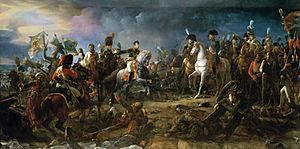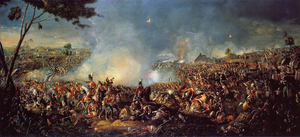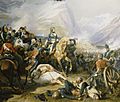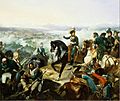Napoleonic Wars facts for kids
Quick facts for kids Napoleonic Wars |
|||||||
|---|---|---|---|---|---|---|---|
  Top: The Battle of Austerlitz Bottom: The Battle of Waterloo |
|||||||
|
|||||||
| Belligerents | |||||||
|
France and allies: French clients:
Confederation of the Rhine |
||||||
| Commanders and leaders | |||||||
| Strength | |||||||
|
|
||||||
| Casualties and losses | |||||||
|
|
||||||
The Napoleonic Wars were a series of big wars. They happened when Napoleon Bonaparte ruled France. These wars started in November 1799, after the French Revolution ended. A peace treaty with the United Kingdom ended in 1802. So, war began again between the United Kingdom and France in 1803.
These wars changed how armies fought in Europe. Cannons became lighter and could move faster. Armies grew much larger than before. They also had better food and supplies. The wars were very destructive. This was partly because of compulsory conscription, which meant many people had to join the army.
France, led by Napoleon, became very powerful quickly. They conquered most of Europe. But then, France lost power just as fast. The French invasion of Russia failed badly. The Napoleonic Wars officially ended on 20 November 1815. This was right after the Battle of Waterloo, a huge battle that Napoleon lost. Napoleon's empire was defeated. The Bourbon royal family ruled France again.
Some people call the time from April 20 1792 to November 20 1815 "the Great French War". On one side was Napoleon's French Empire and its allies, like the Kingdom of Italy. On the other side were countries like Great Britain, Prussia, Austria, Russia, Sweden, Portugal, and Spain.
Contents
Napoleon's Conquests (1805-1812)
On May 18, 1804, Napoleon Bonaparte was crowned Emperor of the French. The next year, a group of countries formed the Third Coalition against France. Napoleon then crowned himself King of Italy. The Austrian Emperor, Franz I, was angry and declared war. This started the War of the Third Coalition.
In October, the British navy destroyed the French navy at the Battle of Trafalgar. In December, Austria and Russia teamed up. They fought the French at the Battle of Austerlitz. The combined Russian and Austrian army lost badly. They had to sign a peace treaty with Napoleon.
In 1806, the War of the Fourth Coalition began. The Kingdom of Prussia declared war on France first. But Napoleon's troops quickly defeated them at the Battle of Jena. Napoleon captured Berlin before Russia could send help. In 1807, Napoleon defeated the Russian army at the Battle of Friedland. This ended the Fourth Coalition.
In 1809, the War of the Fifth Coalition started when Austria declared war again. At first, the Austrians had some success. But later, the French captured Vienna, Austria's capital. This ended the Fifth Coalition.
By 1810, Napoleon was at the height of his power. He controlled France, Spain, northern Italy, and much of Germany. In 1808, the Peninsular War began. This happened when Napoleon made his brother Joseph Bonaparte King of Spain. British, Spanish, and Portuguese troops fought against the French.
In 1809, the Finnish War started between Russia and Sweden. This was because Sweden and Portugal did not make peace with France. Russia took over Finland, which was a big loss for Sweden. By 1811, France and Russia had disagreements. Napoleon then allied with Prussia and Austria. He decided to invade Russia.
The Russian Invasion (1812)
Napoleon launched a huge French invasion of Russia in 1812. Around the same time, the United States and Britain started the War of 1812. In Russia, Napoleon faced his first major challenge. This was at the huge Battle of Borodino.
The Russians had to retreat and abandon their capital, Moscow. Napoleon's troops entered Moscow, but found it empty and burning. The very cold winter and a lack of food devastated Napoleon's army. The Russians used "scorched earth" tactics, burning crops and supplies so the French couldn't use them.
Napoleon's weakened army, called the Grande Armee, had to retreat to Paris. They marched through the freezing Russian winter. The Russian forces finally defeated them. After Napoleon's failure, Prussia and Austria declared war on him. This began the War of the Sixth Coalition. Later, the Russian resistance was celebrated in Leo Tolstoy's novel War and Peace and Peter Ilyich Tchaikovsky's music piece 1812 Overture.
Meanwhile, the much smaller War of 1812 was fought between Britain and the United States. It was mainly about issues at sea. This war continued until 1815, and neither side gained much. In Latin America, revolutions led to many independent states. These new countries were once part of the Spanish Empire.
Battle of Leipzig and Napoleon's First Fall (1813-1814)
The British, Spanish, and Portuguese forces pushed Napoleon's armies out of Spain. This happened after the Battle of Vitoria. The Allies, which included Great Britain, Russia, Prussia, and Austria, then defeated Napoleon. This big defeat was at the Battle of Leipzig.
In 1814, the Allies captured Paris. The brother of King Louis XVI, named Louis XVIII, had already said he was the new French king. Prussian forces sent him to Paris, and he was crowned the Bourbon king. Napoleon was forced to give up his power.
Waterloo and Napoleon's Final Defeat (1815)
Napoleon was sent away to the island of Elba. He almost got assassinated there. But then, he escaped from Elba with about 200 men. He returned to Paris and forced Louis XVIII off the throne. This period is known as the Hundred Days.
The countries that had fought Napoleon before formed the Seventh Coalition. The Duke of Wellington from Great Britain led their forces. With help from the Prussians, he defeated Napoleon again. This final battle was the Battle of Waterloo in 1815. Louis XVIII was put back on the throne, and this began the Second Restoration.
Images for kids
-
French victory over the Prussians at the Battle of Valmy in 1792
-
Bonaparte defeating the Austrians at the Battle of Rivoli in 1797
-
French victory over the Austrians and Russians at the Second Battle of Zürich
-
The British victory over the French at the Battle of Alexandria, resulted in the end of Napoleon's military presence in Egypt.
-
"Maniac-raving's-or-Little Boney in a strong fit" by James Gillray. His caricatures ridiculing Napoleon greatly annoyed the Frenchman, who wanted them suppressed by the British government.
-
The Battle of San Domingo, 6 February 1806
-
The Battle of the Pyrenees, July 1813
-
The British managed to occupy and take control of Cape Colony, British Guiana, Malta, Mauritius and Ceylon during the Napoleonic Wars.
-
The British HMS Sandwich fires at the French flagship Bucentaure (completely dismasted) in the battle of Trafalgar. Bucentaure also fights HMS Victory (behind her) and HMS Temeraire (left side of the picture). HMS Sandwich did not fight at Trafalgar and her depiction is a mistake by the painter.
-
Surrender of the town of Ulm, 20 October 1805
-
The French entering Vienna on 13 November 1805
-
After defeating Prussian forces at Jena, the French Army entered Berlin on 27 October 1806.
-
Charge of the Russian Imperial Guard cavalry against French cuirassiers at the Battle of Friedland, 14 June 1807
-
The Battle of Trangen during the Dano–Swedish War, 1808–1809. The Norwegians fought bravely and defeated the Swedes.
-
Polish cavalry at the Battle of Somosierra in Spain, 1808
-
The Battle of Borodino as depicted by Louis Lejeune. The battle was the largest and bloodiest single-day action of the Napoleonic Wars.
-
Napoleon's withdrawal from Russia, a painting by Adolph Northen
-
Fragment from the manuscript "Memoires on Napoleon's campaigns, experienced as a soldier of the second regiment". Written by Joseph Abbeel, a soldier participating in the War of the Sixth Coalition, 1805–1815.
-
The Battle of Leipzig involved over 600,000 soldiers, making it the largest battle in Europe prior to World War I.
-
The Battle of Hanau (30–31 October 1813), took part between Austro-Bavarian and French forces.
-
The charge of the French Cuirassiers at the Battle of Waterloo against a square of Scottish Highlanders
-
In 1800, Bonaparte took the French Army across the Alps, eventually defeating the Austrians at Marengo.
-
Napoleon on the field of Eylau
-
Napoleon's retreat from Russia in 1812. His Grande Armée had lost about half a million men.
-
French soldiers in skirmish with Bashkirs and Cossacks in 1813
See also
 In Spanish: Guerras napoleónicas para niños
In Spanish: Guerras napoleónicas para niños
 | Claudette Colvin |
 | Myrlie Evers-Williams |
 | Alberta Odell Jones |



































